

Free public domain audiobooks. LearnEnglish Teens. Extensive Reading: sviluppare nei bambini il piacere di legger in inglese. Avete mai sentito parlare dell’EXTENSIVE READING?
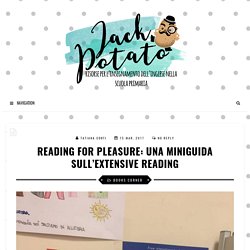
Poco tempo fa ho avuto l’occasione di frequentare un interessantissimo corso gratuito on-line sul clil e le tecnologie TECHNO CLIL FOR EVO 2017 che, alla sua seconda edizione, ha avuto più di 5000 iscritti (per chi volesse approfondire questo è il link alla pagina facebook del corso). Durante il corso ci è stata data la possibilità di approfondire il tema dell’EXTENSIVE READING.
Favorire il piacere della lettura è lo scopo primario di questo approccio, finalizzato anche allo sviluppo della fluidità e della velocità di lettura. Esso quindi si contrappone all’ INTENSIVE READING, secondo cui la lettura è un mezzo per lo studio dei contenuti, tipico dei libri scolastici. ERF Graded Reader List. About english-e-books.net. This site has been created to help people learn English language.
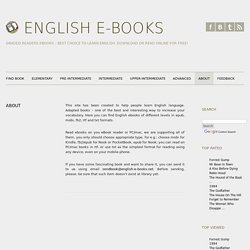
Adapted books – one of the best and interesting way to increase your vocabulary. Here you can find English ebooks of different levels in epub, mobi, fb2, rtf and txt formats. Read ebooks on you eBook reader or PC/mac, we are supporting all of them, you only should choose appropriate type, for e.g.: choose mobi for Kindle, fb2/epub for Nook or PocketBook, epub for Nook; you can read on PC/mac books in rtf, or use txt as the simplest format for reading using any device, even on your mobile-phone. If you have some fascinating book and want to share it, you can send it to us using email sendbook@english-e-books.net.
Before sending, please, be sure that such item doesn’t exist at library yet. Graded Readers. What are “Graded Readers”?
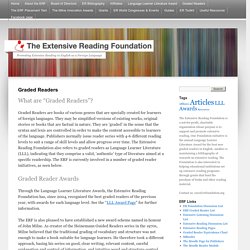
Graded Readers are books of various genres that are specially created for learners of foreign languages. They may be simplified versions of existing works, original stories or books that are factual in nature. They are ‘graded’ in the sense that the syntax and lexis are controlled in order to make the content accessible to learners of the language. Publishers normally issue reader series with 4-6 different reading levels to suit a range of skill levels and allow progress over time. The Extensive Reading Foundation also refers to graded readers as Language Learner Literature (LLL), indicating that they comprise a valid, ‘authentic’ type of literature aimed at a specific readership. Graded Reader Awards Through the Language Learner Literature Awards, the Extensive Reading Foundation has, since 2004, recognized the best graded readers of the previous year, with awards for each language level.
The ERF Graded Reader List The ERF Placement Test. Sundance Literactive Readers Online Stories – Set 1 – Sundance Publishing « RI-MEDIARE LA SCUOLA. Reading Oceans. ELI Language Magazines - Riviste Linguistiche. Oxford Owl - teaching and learning resources from Oxford University Press. Romeo and Juliet. Risorse. Extensive Reading in the CLIL Class. Extensive Readind for CLIL. William Shakespeare. English e-Reader. Extensive reading: why it is good for our students… and for us. What is Extensive Reading (ER)?
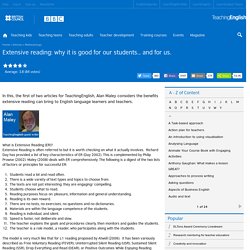
Extensive Reading is often referred to but it is worth checking on what it actually involves. Richard Day has provided a list of key characteristics of ER (Day 2002). This is complemented by Philip Prowse (2002). Maley (2008) deals with ER comprehensively. The following is a digest of the two lists of factors or principles for successful ER: The model is very much like that for L1 reading proposed by Atwell (2006). So what are the benefits of ER? So what does it all add up to? ER develops learner autonomy.There is no cheaper or more effective way to develop learner autonomy.
ER offers Comprehensible Input.Reading is the most readily available form of comprehensible input, especially in places where there is hardly any contact with the target language. ER enhances general language competence.In ways we so far do not fully understand, the benefits of ER extend beyond reading. So why don’t teachers use ER more often? A) Insufficient time. b) Too costly. Reading matters: Extensive reading. What’s the point of Extensive Reading? To celebrate the launch of Project fourth edition, Domino author, Nina Prentice explores the relevance of extensive reading in the upper primary classroom.
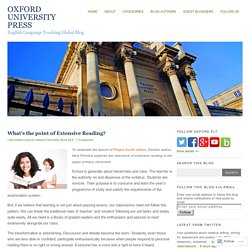
School is generally about hierarchies and rules. The teacher is the authority on and dispenser of the syllabus. Students are novices. Their purpose is to consume and learn the year’s programme of study and satisfy the requirements of the examination system. But, if we believe that learning is not just about passing exams, our classrooms need not follow this pattern. The transformation is astonishing. Extensive reading. The reading skill is most often taught by close study of short passages followed by analysis of language.
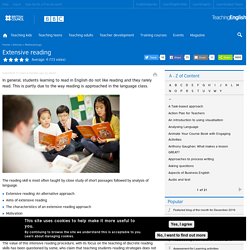
Extensive reading: An alternative approach Aims of extensive reading The characteristics of an extensive reading approach Motivation The teacher's role Conclusion The value of this intensive reading procedure, with its focus on the teaching of discrete reading skills has been questioned by some, who claim that teaching students reading strategies does not necessarily make them better readers. It is widely believed that people become good readers through reading, and that learning how to read should mean a focus of attention on the meaning rather than the language of the text.
Why is extensive reading important? - Fremmedspråksenteret - Høgskolen i Østfold. Reading beyond the textbook: Why is extensive reading important?
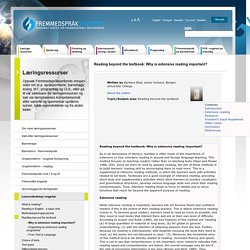
As in all discussions of literacy, mention is often made of the importance of extensive or free voluntary reading in second and foreign language teaching. This method focuses on teaching readers rather than on teaching texts (Haas and Flower 1988, 169). Since we learn to read by actually reading, the aim of these methods is to build learners' reading skill by encouraging them to read more. This is a supplement to intensive reading methods, in which the learners work with activities related to set texts.